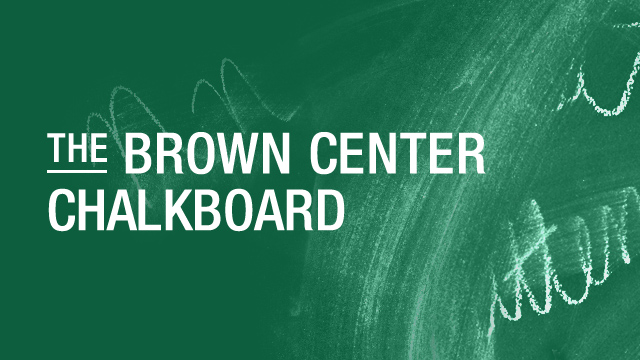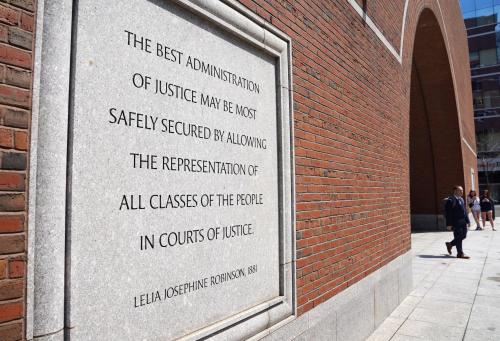The first presidential debate passed last week without discussion of K-12 education. One possible explanation, I argued last week, is that neither major party has a former governor at the top of the ticket, meaning there is no gubernatorial record on education to flaunt or attack. With K-12 education more central to governors’ portfolios than presidents’ portfolios, discussion about education in presidential elections often focuses on candidates’ records in their home states. However, while this election is unusual in that neither presidential nominee served as governor (only the second time since 1972), it is also unusual in that both vice presidential nominees have served as governor (the first time since 1968). If K-12 education is to receive attention during this debate cycle, Tuesday could be the day.
Which K-12 issues might they discuss? Two topics—Common Core State Standards and school choice—stand out for being recognizable to the public, prominent in the VP candidates’ governing records, and likely sources of disagreement between the presidential candidates.
Common Core State Standards
Mike Pence leaves no doubt about where he stands on Common Core. After his predecessor in the governor’s office, Republican Mitch Daniels, made Indiana one of the first states to adopt the standards, Pence made it the first to withdraw. He cited a fundamental concern about states’ rights, saying that Indiana’s standards would be written “by Hoosiers, for Hoosiers” even if the state-designed standards largely align with the Common Core State Standards (as they do).
Tim Kaine’s history with Common Core is more nuanced. Kaine was governor of Virginia when it submitted its Race to the Top (RTTT) phase 1 application in 2010. Aware that the RTTT scoring rubric valued the adoption of common standards, Kaine and his colleagues attempted to thread a needle by pledging to help with the development of common standards without actually committing Virginia to adopting them. They claimed that Virginia’s standards were more rigorous than the likely common standards, but the RTTT reviewers didn’t buy it. Virginia finished 31st in the competition, in part because of its low score in “Standards and Assessments.” Kaine has stayed relatively silent on Common Core since then.
Of course, neither vice presidential nominee, no matter what he believes, is likely to veer far from his party’s presidential nominee. Donald Trump, like Kaine, adamantly opposes Common Core. He pledged to stop the federal government from infringing on states’ discretion to set their own standards by, ironically, infringing on states’ discretion to set their own standards (“I will direct the Department of Education that Common Core ends today”). Hillary Clinton has generally supported Common Core but tiptoed around the issue, leaving it off of her website’s K-12 “Issues” page, perhaps because of the topic’s political sensitivity. A recent EdNext poll shows the country evenly split on Common Core, with support down sharply since 2015.
School Choice
Pence is also clear about where he stands on charter schools and private school voucher programs. He’s for them. He sought a per-pupil funding increase of $1,500 for Indiana charter schools, ultimately settling on an increase of $500 per pupil (for new and high-performing charter schools) and a $50-million low-interest loan program to cover construction and technology costs. Moreover, he raised a cap on vouchers and oversaw a major expansion in the state’s voucher program. He touts that he built the largest school voucher program in the country—a claim that The Washington Post disputes.
Kaine, meanwhile, has demonstrated little enthusiasm for school choice reforms. “To be sure, Kaine is not part of the so-called education reform camp,” says Lauren Camera of U.S. News & World Report. Virginia was home to only a few charter schools during Kaine’s watch, and Kaine’s wife, Anne Holton, did little to reverse that during her tenure as Virginia’s secretary of education.
Here, too, the views of Pence and Trump are well aligned. Trump pledged to become “the nation’s biggest cheerleader for school choice” and proposed a $20 billion block grant for money that would follow students to the schools their families choose, public or private. And here, too, Clinton’s views—like Kaine’s—are more nuanced. Long an opponent of vouchers and proponent of charter schools, Clinton ruffled feathers in the charter school community after suggesting that most charter schools “don’t take the hardest-to-teach kids, or, if they do, they don’t keep them.” Clinton has maintained, however, that charter schools have a role to play in U.S. public education, drawing jeers from a National Education Association assembly when she encouraged the sharing of best practices across charter and traditional public schools.
Looking Ahead
Of course, there is no guarantee that this year’s vice presidential debate will address Common Core or school choice, or that it will address K-12 education at all. Perhaps another K-12 issue will take the stage, like career and technical education (a focus of both Kaine and Pence), or perhaps education will offer a way to talk about broader issues like public sector unions or LGBT rights. If K-12 is discussed, however, it seems like a good bet that it will involve Common Core or school choice—two of the most controversial issues of their time.
The Brookings Institution is committed to quality, independence, and impact.
We are supported by a diverse array of funders. In line with our values and policies, each Brookings publication represents the sole views of its author(s).








